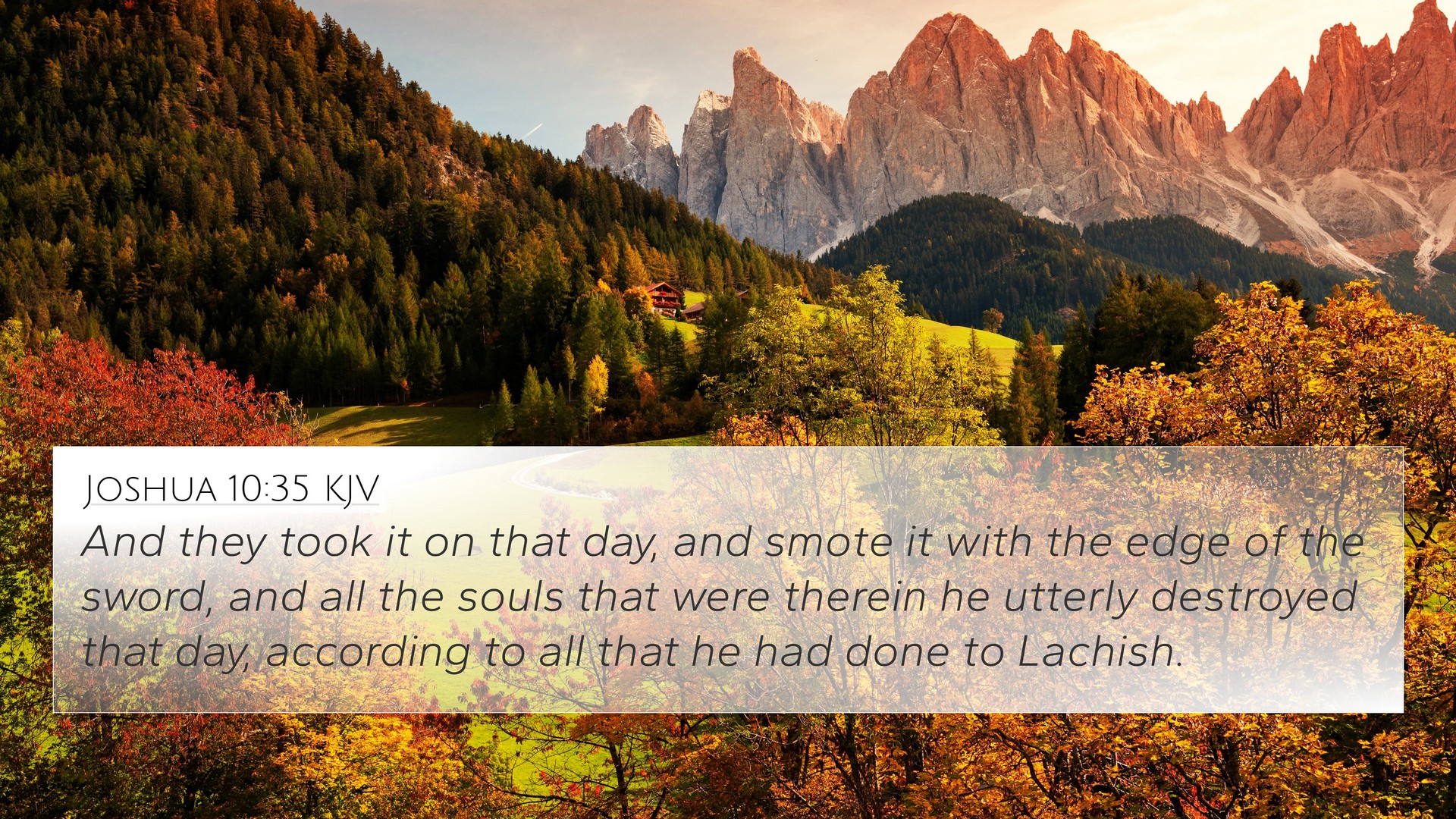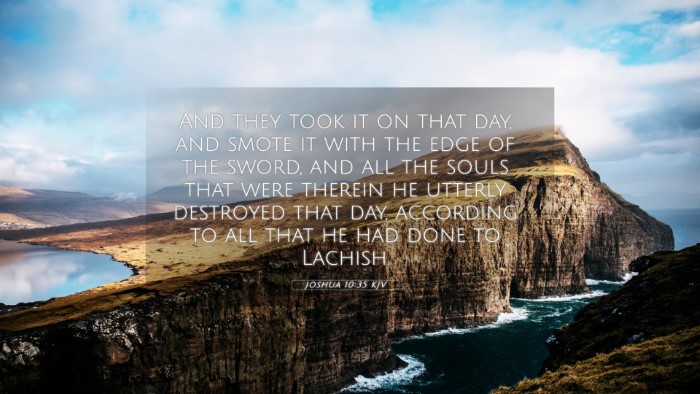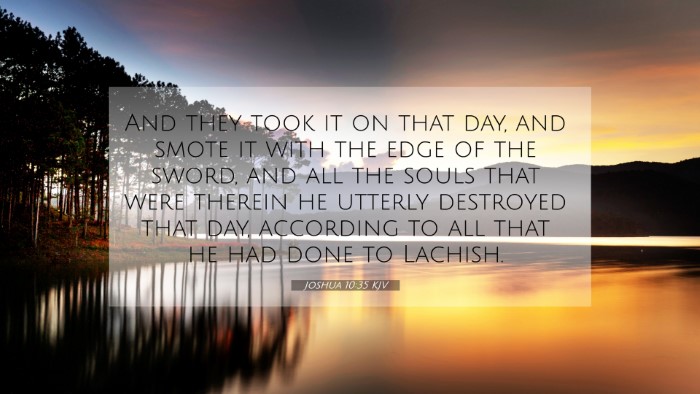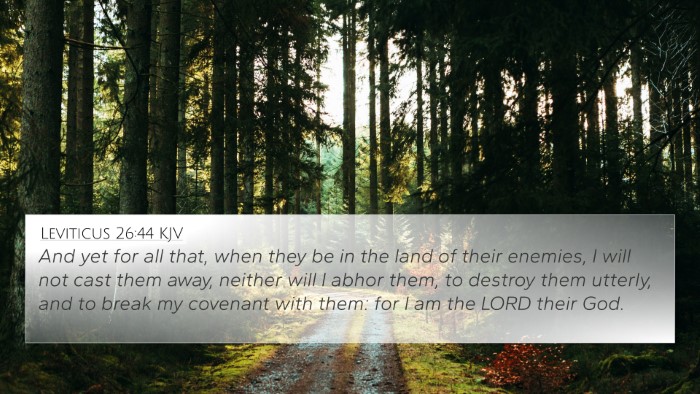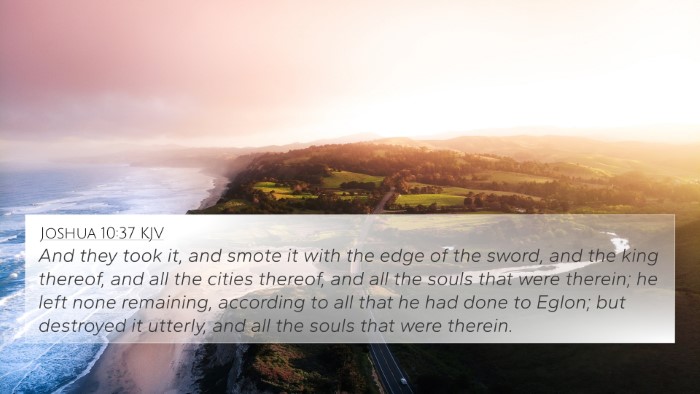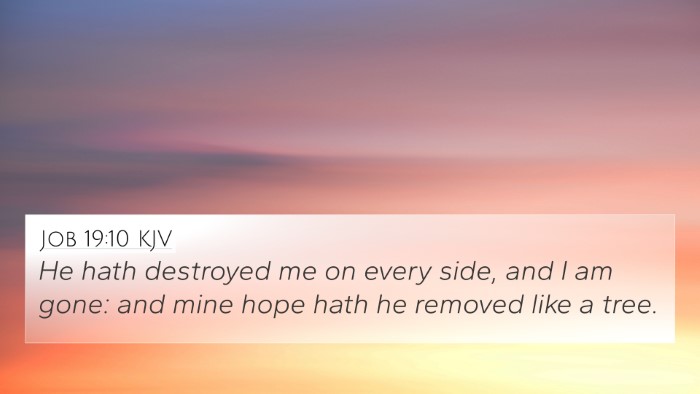Understanding Joshua 10:35
Joshua 10:35 is a part of the narrative where the Israelites, under the leadership of Joshua, are in the midst of conquering the land of Canaan. The verse states: "And that day Joshua took Makkedah, and smote it with the edge of the sword, and the king thereof he utterly destroyed, and all the souls that were therein; he let none remain: and he did to the king of Makkedah as he did unto the king of Jericho."
Verse Meaning and Context
This verse depicts a significant event in Israel’s military campaign against the inhabitants of Canaan. It highlights the ruthless approach taken by Joshua in fulfilling the command of God for Israel to possess the land, reflecting the broader themes of divine judgment and the fulfillment of God’s promises to His people.
- Divine Command: Joshua’s actions are seen as obedience to God’s commands, illustrating the concept of theocratic justice — God using Israel as an instrument to execute judgment on the nations.
- Historical Context: The narrative is placed within the broader context of the conquest of Canaan, emphasizing the importance of establishing a foothold for the Israelite nation under divine guidance.
- Military Campaign: Makkedah was one of the cities targeted in a decisive military strategy, showcasing the military prowess and commitment of Israel in claiming their promised inheritance.
Insights from Public Domain Commentaries
When analyzing Joshua 10:35, several key commentaries provide deeper insights:
- Matthew Henry: He emphasizes that the destruction of Makkedah reflects God's judgment on sin and the necessity of purity in the land that God promised to His people. The complete destruction of the inhabitants underscores the seriousness with which God views sin and disobedience.
- Albert Barnes: He notes the significance of the phrase 'utterly destroyed' and suggests that this speaks to God's sovereignty and power in delivering on His promises, as well as the finality with which He judges the nations that oppose His will.
- Adam Clarke: Clarke remarks on the military success achieved by Joshua and connects it to the overarching theme of faithfulness to God's covenant, highlighting that the victories are extensions of God's promises to Abraham, Isaac, and Jacob.
Bible Verse Cross-References
Joshua 10:35 connects to several other scripture passages which provide a comprehensive understanding of the themes at play:
- Joshua 6:21: "And they utterly destroyed all that was in the city, both man and woman, young and old, and ox, and sheep, and ass, with the edge of the sword." - This highlights the nature of the conquest.
- Deuteronomy 20:16-17: "But of the cities of these people, which the Lord thy God doth give thee for an inheritance, thou shalt save alive nothing that breatheth; but thou shalt utterly destroy them." - Establishes the divine command for destruction.
- 1 Samuel 15:3: "Now go and smite Amalek, and utterly destroy all that they have, and spare them not..." - A similar call for judgment and destruction of a specific people for their sin against God.
- Matthew 10:14: "And whosoever shall not receive you, nor hear your words, when you depart out of that house or city, shake off the dust of your feet." - Illustrates the New Testament perspective of judgment upon those that reject God's message.
- Romans 6:23: "For the wages of sin is death; but the gift of God is eternal life through Jesus Christ our Lord." - Speaks to the ultimate consequence of sin, connecting the themes of judgment in the Old Testament with redemption in the New Testament.
- Hebrews 11:30: "By faith the walls of Jericho fell down, after they were compassed about seven days." - Highlights the faith involved in the conquests.
- Revelation 19:15: "And out of his mouth goeth a sharp sword, that with it he should smite the nations..." - A depiction of divine judgment that parallels the themes of conquest seen in Joshua.
Thematic Bible Verse Connections
The themes present in Joshua 10:35 can be linked to broader Biblical themes:
- Judgment and Justice: Numerous passages reflect on God’s justice, such as Revelation 20:11-15, which discusses the final judgment of humanity.
- Promised Land and Covenant: The significance of the land promise in Genesis 15:18-21 connects Joshua's military victories to God's covenantal faithfulness.
- Divine Sovereignty: Psalm 24:1 reminds us of God's ownership over the earth and everything in it, resonating with the narrative of conquest where God directs Israel’s victory.
How to Use Bible Cross-References
To deepen your understanding of Joshua 10:35, consider employing cross-reference tools:
- Bible Concordance: Use a concordance to locate similar themes or words within the scripture.
- Coding Scripture: Mark cross-referenced verses in your Bible to visualize connections.
- Study Guides: Utilize study materials that provide thematic connections.
Conclusion
Joshua 10:35 serves as a powerful reminder of the themes of judgment, obedience, and fulfillment of divine promises. By exploring this verse through cross-references and public domain commentaries, believers can deepen their understanding of how God works through history and the implications for faith today.
